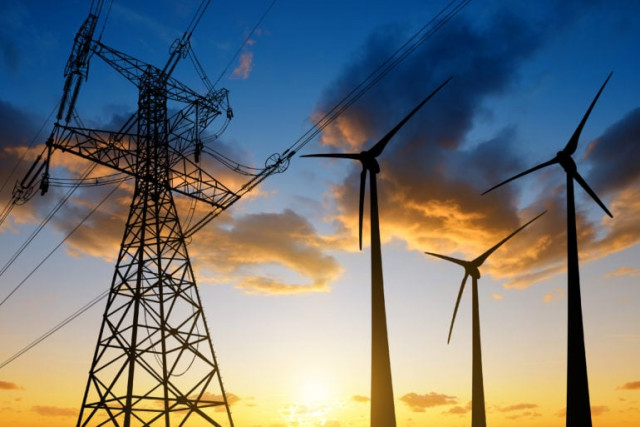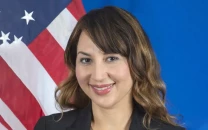ECC approves 33% hike in power tariff
Average electricity price to increase by at least Rs1.20 per unit or 10.3% to Rs12.91

File photo of high voltage tower and wind turbines against the sunset. PHOTO: AFP
In order to give a boost to the agriculture sector, the government has also drastically cut the electricity prices for the agriculture sector, bringing down the per unit price by Rs5 to Rs5.35 per unit.
It has also protected the small and medium commercial consumers from the hike. The schools and hospitals have also been exempted from the increase, said the Power Division.
The Economic Coordination Committee (ECC) of the Cabinet approved to increase the average electricity prices by at least Rs1.20 per unit or 10.3% to Rs12.91, according to the government officials.
Delayed gas-power plants set for final checks
The decision will help the government to recover minimum Rs123.6 billion from the consumers on account of tariffs. In addition, the consumers will also pay Rs21 billion additional sales tax.
Finance Minister Asad Umar chaired the ECC meeting – the second in last three days, which finally took the politically unpopular decision.
The summary for increase in tariffs will now be placed before the federal cabinet today (Thursday) for ratification and after that the National Electric Power Regulatory Authority (Nepra) will notify the new electricity prices.
The PTI government has blamed the last PML-N government for the surge in prices, saying the increase was inevitable due to high cost of power generation and payments of net hydel profit to the provinces.
Nepra had proposed to increase the average electricity prices by Rs3.82 per unit. The Power Division officials said the government would give minimum Rs1.20 per unit direct subsidy. The average 10% increase in power prices would reduce the build-up of circular debt only to the extent of tariff increase.
The issues of high line losses, less recovery of electricity bills and electricity prices and arrears of the consumers of the Azad Jammu & Kashmir and agriculture tube-wells of Balochistan remain unaddressed.
The tariff increase will also not address the legacy issue of the Rs1.26 trillion outstanding circular debt. The government has protected the consumers using up to 300 units electricity per month from the increase.
For those whose monthly consumption is between 301 to 700 units, the prices have been increased by at least 10%. Similarly, for consumers using more than 700 electricity units in a month, the minimum 15% average increase has been approved.
For the commercial category, the government has increased the electricity prices around 20% and for the bulk category domestic consumers the minimum increase is nearly 33%, the officials added.
The electricity prices for the industrial consumers except for five export-oriented sectors have also been increased. These five sectors are textile, garments, leather, surgical and sports goods.
These five export oriented sectors will be provided electricity at 7.50 cents per unit, as had been promised by the PTI in its elections manifesto.
The Power Division said only a minimum increase was approved in electricity prices for industrial consumers in all categories, barring the five export oriented sectors. It added the Rs3 per unit electricity subsidy will also for industrial consumers will continue in future as well.
“In the most difficult of economic conditions, the tariff proposal has been made to ensure protection of poor and middle classes,” said the Power Division. Through the present proposal, the agriculture and industry would receive a much needed boost, it added.
The officials said the government will require minimum Rs149 billion subsidy on account of tariff differential. This is significantly higher than Rs105 billion subsidy earmarked in the budget.
In addition to that the government will also need Rs75 billion for paying subsidies to agriculture tube wells and the K-Electric. The total subsidies are estimated at Rs224 billion, at least. The government has not fully passed on the increase in electricity prices due to net hydel profit payments to the provinces.
The impact of Rs65 billion that translates into 66 paisa per unit on account of net hydel profit has not been transferred to the consumers. The money has been paid to Punjab and Khyber Paktunkhwa by borrowing from the banks.
The officials said increase on account of net hydel profit will be considered at the time of next year’s tariff determination. For the time being, the government will get the loans rollover.
Alvi emphasises on meeting Karachi’s electricity needs
The PTI government had promised to improve governance in the power sector by reducing line losses and improving recovery of the electricity bills. The Power Division has been assigned the targets to reduce line losses and increase the overall recovery of electricity bills by the ECC.
The division has been given the target to reduce both losses and improve recovery by 1% each during the current fiscal year, said the officials. Similar targets had also been given in the past but things did not change in the Power Division and its distribution companies.
The desk audit by the department of the Auditor General of Pakistan disclosed that four loss making power distribution companies (DISCOs) incurred Rs47 billion line losses over and above the threshold determined by Nepra last year. Pesco’s recovery against current bills was 74.83%, Hesco’s 52.31%, Sepco 39.62% and Qesco was recovering only 15.42% of the current billed amount.



















COMMENTS
Comments are moderated and generally will be posted if they are on-topic and not abusive.
For more information, please see our Comments FAQ